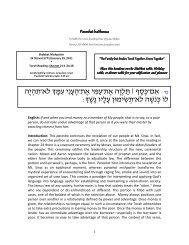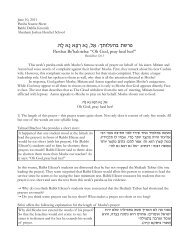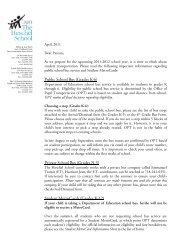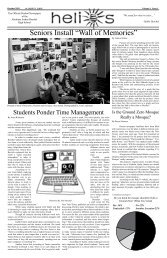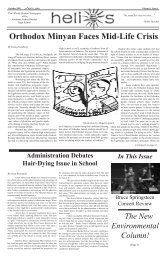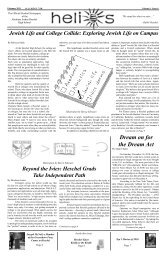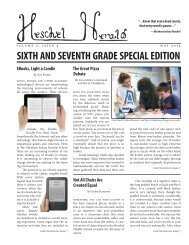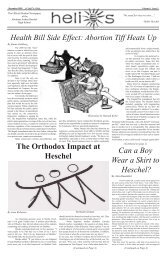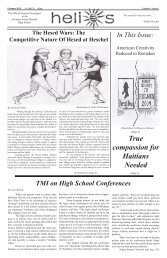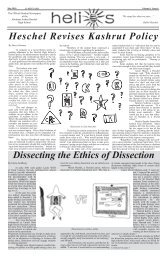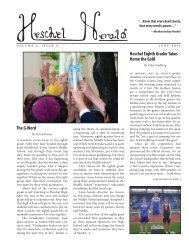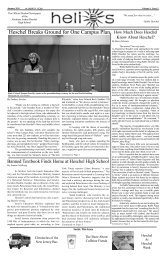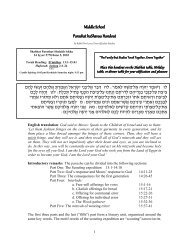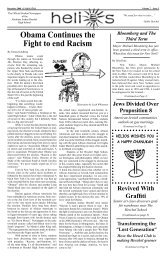Middle School Parashat haShavua Handout - The Heschel School
Middle School Parashat haShavua Handout - The Heschel School
Middle School Parashat haShavua Handout - The Heschel School
Create successful ePaper yourself
Turn your PDF publications into a flip-book with our unique Google optimized e-Paper software.
PDF-XChange<br />
w w w.docu-track.co m<br />
Click to buy NOW!<br />
PDF-XChange<br />
w w w.docu-track.co m<br />
Click to buy NOW!<br />
<strong>Middle</strong> <strong>School</strong><br />
<strong>Parashat</strong> <strong>haShavua</strong> <strong>Handout</strong><br />
by Rabbi Dov Lerea, Dean of Judaic Studies<br />
Shabbat Toledot<br />
4 Kislev 5770/November 21, 2009<br />
*<br />
Torah Reading:<br />
Bereshit/Genesis 25:19-28:9<br />
Haftarah: Malakhi 1:1-2:7<br />
“<strong>The</strong> Family that Studies Torah Together, Grows<br />
Together”<br />
Place this handout on the Shabbat table, Holiday<br />
table, or dinner table for your edification and pleasure<br />
: <br />
: : <br />
: :<br />
<br />
: : <br />
: <br />
:<br />
: : <br />
: <br />
: : <br />
: <br />
: <br />
: : <br />
: <br />
: <br />
: <br />
English: 13 And Isaac become wealthy, and grew more and more. 14 He had flocks, herds, and a great household;<br />
and the Philistines envied him. 15 Now all the wells which his father's servants had dug in the days of Abraham his<br />
father, the Philistines had stopped and filled them with earth. 16 And Avimelech said to Isaac: 'Go from us; you are<br />
much mightier than we.' 17 So Isaac left, and encamped in the valley of Gerar, and dwelt there. 18 And Isaac dug again<br />
the wells of water, which they had dug in the days of Abraham his father; for the Philistines had stopped them after the<br />
death of Abraham; and he called their names after the names by which his father had called them. 19 And Isaac's<br />
servants dug in the valley, and found there a well of fresh water. 20 And the shepherds of Gerar fought with Isaac's<br />
shepherds, saying: '<strong>The</strong> water is ours.' And he called the name of the well Esek(ie., fight); because they fought with him.<br />
21 And they dug another well, and they fought for that also. And he called the name of it Sitnah (contention). 22 And<br />
he left there, and dug another well; but there they did not fight. So he called the name of it Rehovoth (wide, open place);<br />
and he said: 'For now God has made room for us, and we shall be fruitful in the land.' 23 And he went up from there to<br />
Beer-sheba. 24 And God appeared to him the same night, and said: 'I am the God of Abraham thy father. Fear not, for I<br />
am with you, and will bless you, and multiply your seed for My servant Abraham's sake.' 25 And he built an altar there,<br />
and called God’s name, and pitched his tent there; and there Isaac's servants dug a well. 26 <strong>The</strong>n Avimelech went to<br />
him from Gerar, and Ahuzzath his friend, and Phicol the captain of his army. 27 And Isaac said to them: 'Why have you<br />
come to me, since you hate me, and have sent me away from you?' 28 And they said: 'We saw plainly that God was<br />
with you, so we said: Let there now be an oath between us, between us and you, and let us make a covenant with you;<br />
29 that you will not injure us, as we will have injure you, and as we have done nothing but good for you, and have sent<br />
you away in peace; now are you now the blessed of God.' 30 And he made them a feast, and they ate and drank. 31 And<br />
they arose early in the morning, and vowed to each other; then Isaac sent them away, and they departed from him in<br />
peace. 32 And it came to pass the same day, that Isaac's servants came, and told him concerning the well which they<br />
had dug and said to him: 'We have found water.' 33 And he called it Shivah (Oath, vow). <strong>The</strong>refore the name of the city<br />
is Beer-sheva (<strong>The</strong> Well of the Covenantal Oath) to this very day.<br />
1
PDF-XChange<br />
w w w.docu-track.co m<br />
Click to buy NOW!<br />
PDF-XChange<br />
w w w.docu-track.co m<br />
Click to buy NOW!<br />
Introductory remarks: <strong>The</strong> structure of this parasha evokes the power of its central theme: the tension and<br />
struggle at the heart of living in covenant with God. <strong>The</strong> parasha opens and closes with altercations, competition,<br />
opportunism and deceit between brothers Esau and Jacob. As young men, the hearty, dedicated, technically skilled<br />
hunter Esau returns from the hunt exhausted, only to be extorted from his privileged status of the bechora, the birth-rite,<br />
by Jacob in exchange for food. <strong>The</strong> parasha closes with the narrative of Isaac’s blessing at the end of his life—the<br />
blessing which would confer upon the blessed son the major portion of the clan’s inheritance, and carry with that the<br />
mantle of covenantal leadership into the next generation. In order to secure his position, Jacob and Rivka conspire<br />
against Esau, take advantage of the aging patriarch’s failing eyesight, and deceive Isaac into blessing Jacob before Esau.<br />
<strong>The</strong> Torah is clear about both acts by Jacob; there is little evidence in a plain reading of the text to indicate Esau’s<br />
moral, intellectual or intuitive inferiority or incapacity to lead. Quite the contrary; it is Jacob whose moral character the<br />
text calls into question by describing the boldness of his chicanery. Interestingly, chapter 26 bridges these two<br />
momentous events in the narrative history of our ancestors. That chapter conveys the only two other moments in<br />
Isaac’s life which the Torah transmits to us. Isaac travels to the land of Gerar, where his father Abraham had been<br />
before him. <strong>The</strong>re, Isaac repeats the same mis-judgment that his father had made: when the people of Gerar see Rivka,<br />
they desire her for themselves, and Isaac tells them that she is his sister rather than his wife. This is followed by the one<br />
activity the Torah records of Isaac’s life-work: he travels throughout the territory re-digs his father’s wells which had<br />
been filled in by local residents. This results in a competition for water between the shepherds of Gerar and the<br />
shepherds of Isaac’s clan, which is resolved by Isaac entering into an alliance with the people of Gerar. In other words,<br />
sandwiched between two moments of un-resolvable tension and conflict between his own two sons, Isaac spends his<br />
days re-claiming his father’s wells and resolving his political conflicts with his neighbors by entering into a covenantal<br />
treaty with them.<br />
Questions for thought and discussion on the Torah reading:<br />
1. Perhaps Esau was limited in his capacity to grow into a leadership role, while Jacob had<br />
the potential which the future generation would need. Still—do any means justify the<br />
ends?<br />
2. It is striking that Isaac could enter successfully into a covenant with the King of Gerar in<br />
the land of the Philistines, and not control the contention and strife between his own sons.<br />
3. Note the importance of land, boundaries, and water in entering into covenant between our<br />
patriarch Isaac and the nations of Gerar. Who controls water today in the middle east?<br />
Perhaps we make the mistake of thinking the conflicts are all about religion, and not<br />
enough about natural resources. Note in the map below how the water-sources must be a<br />
source of conflict between Israel, Syria and Jordan, at the very least.<br />
<strong>The</strong> Future of <strong>Middle</strong> East Water Facing historical, psychological and<br />
political barriers that have impeded cooperation and deadlocked diplomacy,<br />
nations in the region are sliding toward conflict over water. Water’s growing<br />
role in the emerging hydropolitics of the region has stressed the need for a<br />
new approach to safeguard this diminishing resource. <strong>The</strong> integration of<br />
water into developing strategic cooperation frameworks becoming visible<br />
among regional states could facilitate the protection and preservation of<br />
water resources. This interaction could eventually pave the way for the longterm<br />
security of <strong>Middle</strong> East water. In light of the formidable barriers that<br />
have prevented agreement to date, such an approach may represent the only<br />
method by which to turn back the tide of the new water politics of the<br />
<strong>Middle</strong> East. (from, “<strong>The</strong> New Water Politics in the <strong>Middle</strong> East,” by Ilan<br />
Berman & Paul Michael Wihbey, in, Strategic Review, Summer, 1999)<br />
From the classic commentaries (Ramban; Spain, 12 th century:)<br />
, . .<br />
, ,<br />
"" . ,<br />
() , ,<br />
, .'<br />
, .<br />
2
PDF-XChange<br />
w w w.docu-track.co m<br />
Click to buy NOW!<br />
PDF-XChange<br />
w w w.docu-track.co m<br />
Click to buy NOW!<br />
() ,<br />
,<br />
, .<br />
) , , <br />
. ' ' (<br />
, , () <br />
:<br />
English: <strong>The</strong>y named the well, Eseq. <strong>The</strong> Torah spills so much ink on the story of the wells! On the face<br />
of it, this story certainly does not cast Isaac in a very dignified light, nor does this story advance the<br />
narrative significantly! However, its meaning is found in its mystical interpretation, foretelling future<br />
events. <strong>The</strong> phrase, they found fresh water, the waters of life! alludes to the Holy Temple of Jerusalem, for<br />
God is the well-spring of all life. <strong>The</strong>y called this first well, Eseq/conflict, just as there were multiple<br />
conflicts surrounding the first Temple until it was destroyed. <strong>The</strong>y called the next well, Sitna/contention,<br />
since the contentiousness and fractiousness surrounding the second Temple were worse than the first,<br />
resulting in harsh exile. <strong>The</strong> third well was called, Rehovoth/Openness. This refers to the third Temple, may<br />
it be built speedily in our days, which will constructed free of contention and conflict. At that time, God<br />
will enlarge the boundaries of our land—a promise by God for the future. This is the meaning of the<br />
prophet Ezekiel’s statement about the future Temple: It will be a place of openness, wide, accommodating<br />
and ever-high, allowing us to populate the land. This means that in that time, all the nations of the world<br />
will worship together, “shoulder to shoulder,” i.e., with a shared vision and common purpose for God’s<br />
world.<br />
Questions for thought and discussion based on this comment by the Ramban:<br />
1. <strong>The</strong> Ramban reads this narrative of the wells symbolically and mystically, providing a paradigm<br />
for understanding future historical events. <strong>The</strong> wells represent the well-spring of human<br />
spirituality, the Temple, God’s place on earth. <strong>The</strong> conflicts represent the exiles and destructions<br />
of that Temple. What is the future message of this section according to his reading? I suggest that<br />
the Ramban believes that the future Temple will be constructed when all nations share a common<br />
vision and purpose for the world. This is represented by resolving the conflicts over water. <strong>The</strong><br />
third well was called, Rehovoth. <strong>The</strong> competing nations found a way to share and re-direct the<br />
water such that there would be enough to nourish everyone.<br />
a. Is this message inspiring to you, or naieve?<br />
b. Do you believe that all the competing nations in the <strong>Middle</strong> East can share a common<br />
vision which values each other, including a vision of sound boundaries and borders for a<br />
strong State of Israel?<br />
c. Were the world that our patriarch Isaac had to negotiate, and the conflicts he had to<br />
resolve, less complex than today’s? Is technology what makes our conflicts more<br />
complex, or does the hope for conflict resolution depend ultimately on will and mind-set?<br />
d. Do you read the Ramban as meaning the Temple will be re-built literally, a building<br />
made of stone and wood, or do you read the Ramban to mean that the spiritual attitude of<br />
sharing a common problem and finding a solution, so that all nations join forces to<br />
protect and develop God’s world together is itself the substance of that Temple?<br />
e. Is saying that the Ramban did not literally hope for the literal re-building of the Temple<br />
just making the Ramban into a modern, American, Jewish New Yorker who like to think<br />
about symbols only? Is there anything in the Ramban’s wording which helps us figure out<br />
if we are supposed to read him literally or metaphorically?<br />
Mitzvoth in the Parashah according to the Sefer haHinuch*: <strong>The</strong>re are no mitzvoth in<br />
parahshat toledot<br />
* Sefer ha-Chinuch ( Hebrew: "Book of Education") is a work which systematically discusses the 613 commandments of<br />
the Torah. It was published anonymously in 13th Century Spain. <strong>The</strong> work enumerates the commandments (Hebrew: Mitzvot; sing.<br />
3
PDF-XChange<br />
w w w.docu-track.co m<br />
Click to buy NOW!<br />
PDF-XChange<br />
w w w.docu-track.co m<br />
Click to buy NOW!<br />
mitzvah) according to their appearance in the Weekly Torah portion. Some scholars ascribe the authorship of Sefer ha-Chinuch to<br />
Rabbi Aharon HaLevi of Barcelona (1235-c. 1290), a Talmudic scholar and halakhist but others disagree, as the views of the Chinuch<br />
contradict opinions held by HaLevi in other works. This has led to the conclusion that the true author to Sefer HaChinuch was a<br />
different Reb Aharon Halevi, a student of the Rashba, rather than his colleague.<br />
4



